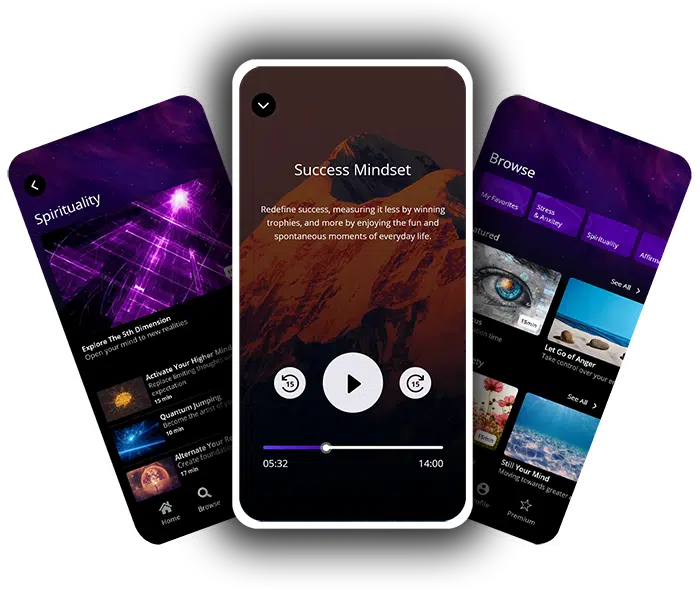Do you often feel like you understand people’s emotions without them saying a word? Being an empath means having this unique ability. This article will guide you through signs and traits to see if you’re one.
Let’s find out together.
Table of contents
Key Takeaways
- Empaths feel others’ emotions as their own, which makes them highly sensitive and intuitive.
- Being around crowds or noise can drain an empath’s energy, so they need alone time to recharge.
- Setting boundaries is hard but crucial for empaths to protect their emotional well-being.
- Empaths have strong connections with animals and nature, finding comfort in being outdoors.
- Creative expression through art, music, or writing helps empaths process their emotions.
Defining an Empath
An empath is someone who can deeply understand and share the feelings of others. They often absorb the emotions of those around them, feeling them as if they were their own.
Characteristics of an Empath
Empaths have a unique set of traits that sets them apart. They feel the world deeply, taking on the emotions of those around them.
- Highly sensitive to others’ emotions: You sense feelings as if they’re your own. This sensitivity goes beyond empathy—it’s like you have an emotional echo of others’ experiences.
- Deeply intuitive: You often know things without being told. This psychic ability allows you to read situations and people without obvious clues.
- Needs time to recharge: After being in crowds or engaging deeply with others, you crave solitude to clear your head and soothe your energy.
- Overwhelmed by noise and chaos: Loud environments or chaotic scenes aren’t just annoying—they’re physically draining for you.
- Drawn to self-care practices: You find solace in activities that restore your balance, like meditation, being in nature, or simply staying still in a quiet room.
- Struggles with boundaries: Saying no can be tough because you don’t want to upset others or feel their disappointment.
- Absorbs others’ stress or pain: You might take on physical symptoms or emotional distress from those around you without meaning to.
- Finds joy in helping: Making a difference in someone’s life lights you up inside, even if it means putting their needs before your own.
- Feels connected to animals and nature: Being outdoors or around animals provides a deep sense of comfort and grounding for empaths.
- Easily overwhelmed by sensory inputs: Strong smells, bright lights, and abrasive textures can be more intense for empaths compared to other people.
- Can become easily fatigued by social interaction: Even enjoyable conversations require energy from empaths; too much socializing can leave you exhausted.
Understanding these characteristics helps identify if you resonate with being an empathic person—a gift that allows profound connections with the world but also demands mindful self-care and boundary setting.
Differences Between Empathy and Being an Empath

Understanding the differences between empathy and being an empath is crucial. Here’s a straightforward comparison:
| Empathy | Being an Empath |
|---|---|
| Ability to understand and share the feelings of another. | A heightened ability to feel the emotions and physical sensations of others intensely, as if they are your own. |
| Common in many people, empathy is a basic human capacity. | Less common, being an empath is a specific trait found in a smaller portion of the population. |
| Can be situational, depending on the context and relationship. | Constant and intrinsic, regardless of the situation or relationship. |
| Does not necessarily lead to emotional or physical drain. | Often results in feeling overwhelmed, emotionally or physically drained due to absorbing others’ emotions or pains. |
| Empathy involves a conscious choice and effort to connect with another’s emotions. | For empaths, the connection is automatic, often occurring without a conscious choice. |
| Skills in empathy can be developed and enhanced with practice and awareness. | Being an empath is innate and not something you can learn to be or not be. |
If you find yourself overwhelmed in crowded places, sensitive to noise, and needing time alone to recharge, it’s possible you’re more than empathetic—you might be an empath. This trait, while challenging, also allows for deep connections with others and a rich, intuitive understanding of the world. Recognizing and managing this ability can lead to a balanced and fulfilling life.
Signs You Might Be an Empath

Do you often feel overwhelmed by other people’s emotions? Are you deeply intuitive and need alone time to recharge? These could be signs that you possess empathic abilities.
Highly Sensitive to Others’ Emotions
You pick up on feelings like a radio catches stations. This sensitivity to the emotions of others means you often know how someone is feeling without them saying a word. It’s like having an internal empath test that never turns off.
This radar for others’ happiness, sadness, or anger can make you feel deeply connected to people. Yet, it also leaves you open to feeling overwhelmed by all the emotional signals you receive.
Having this kind of empath trait requires finding balance. You might find yourself needing quiet time alone to recharge after being around others. Crowds and loud places can drain your energy fast because your system is always tuned in to how those around you are feeling.
Setting boundaries becomes crucial for managing your empathic abilities so that you don’t get lost in others’ feelings or become too drained emotionally and physically.
Deeply Intuitive
If you often sense things beyond what others do, it may indicate that you are deeply intuitive. Empaths tend to have a strong connection with their intuition, enabling them to pick up on subtle energies and unspoken emotions.
This heightened intuition allows you to understand people’s thoughts and feelings at a much deeper level than most.
Your ability to be deeply intuitive goes hand in hand with being an empath. It involves tuning into not only your own emotions but also the energy around you, allowing you to perceive and interpret the world through a lens of heightened sensitivity and awareness.
These traits contribute significantly to your understanding of others’ emotional states and can help enhance your relationships and interactions with those around you.
By embracing this deep intuitiveness as an inherent part of being an empath, you develop a profound capacity for empathy, insight, and meaningful connections.
Need for Alone Time to Recharge
As a deeply intuitive empath, you often absorb the emotions and energies of those around you. This can leave you feeling drained and overwhelmed. That’s why alone time to recharge is essential for your well-being.
It provides an opportunity for you to reset and regain balance by disconnecting from the intense emotions and stimuli that impact your sensitive nature.
During this time, try activities that help replenish your energy, such as meditation, spending time in nature, or engaging in creative pursuits. Setting boundaries and prioritizing self-care will allow you to manage the emotional toll of absorbing others’ feelings while nurturing your own mental and emotional health.
By recognizing the need for alone time to recharge, you can honor your empathic abilities while maintaining a strong sense of self.
Overwhelmed by Crowds and Noise
Feeling overwhelmed in crowded places and sensitive to excessive noise is a common sign of being an empath. This sensitivity may lead you to feel emotionally drained and in need of time alone to recharge.
Pay attention to these cues as they can indicate your empathic nature, allowing you to better understand yourself and manage your emotions amidst overwhelming environments.
Types of Empaths

Emotional Empaths, Intuitive Empaths, and Physical Empaths are the three main types of empaths. If you’re curious about what each type means, click here to read more.
Emotional Empaths
Emotional empaths, like you, have a powerful ability to absorb and sense the emotions of those around them. You can easily pick up on the feelings of others and often find yourself deeply affected by their emotional state.
As an emotional empath, it’s not uncommon for you to experience intense emotional reactions to situations that may not directly involve you. This heightened sensitivity means that you may feel overwhelmed or drained by negative energies in your environment, particularly in crowded or noisy settings.
Being an emotional empath also grants you the gift of being able to deeply connect with others on an emotional level and offer genuine empathy and support during times of need. This unique ability allows you to create strong and meaningful relationships based on your deep understanding of people’s emotions.
Intuitive Empaths
Transitioning from emotional empaths to intuitive empaths, it’s essential to recognize the distinct traits of this empathic type. Intuitive empaths possess a heightened sense of intuition, often able to pick up on subtle cues and energies that others may miss.
They have an innate ability to sense how others feel without needing explicit verbal or visual cues, making them naturally perceptive individuals. The highly intuitive nature of these empaths allows them to deeply connect with others and understand their emotions beyond the surface level, enabling them to offer meaningful support and insight.
Without forsaking brevity or substance, I will ensure that relevant keywords from the provided list are judiciously incorporated into the content.
Physical Empaths
As a physical empath, you have an innate ability to pick up on and feel the physical sensations of others. This means that you can tune into the bodily discomfort or pain that someone else may be experiencing, often without them having to say a word.
You find yourself experiencing similar physical symptoms when in close proximity to others who are unwell or in pain. It’s important for you as a physical empath to recognize this gift within you and learn how to manage it effectively so that it doesn’t become overwhelming.
Physical empaths possess a heightened sensitivity towards the physical conditions of those around them. They may experience feelings of fatigue, headaches, or general unease after being exposed to certain environments or individuals who are dealing with illness or bodily discomfort.
By incorporating grounding techniques and setting clear boundaries, you can better navigate these experiences and mitigate their impact on your own well-being while using your empathic abilities for healing and support where needed.
Challenges Faced by Empaths
1. Empaths often experience emotional overload due to their heightened sensitivity.
2. Difficulty in setting boundaries can lead to feeling overwhelmed by others’ emotions and energy drain.

Emotional Overload
Being an empath means you absorb the emotions of those around you, often leading to emotional overload. This can leave you feeling drained and overwhelmed, especially in crowded or noisy environments.
Your deep connection with others’ feelings also makes it challenging to set boundaries, as it’s tough to distinguish between their emotions and your own. Moreover, the suffering of others can weigh heavily on your heart, amplifying the emotional load you carry.
To cope with this emotional overload, consider finding ways to create a sanctuary for yourself. Seek out quiet spaces where you can recharge and reground yourself away from the energy drain of others.
By setting clear boundaries and prioritizing self-care, such as meditation or taking solitary walks in nature, you can protect yourself from being emotionally overwhelmed while still using your empathic abilities to positively impact those around you.
Moving on to “Difficulty Setting Boundaries” – let’s delve into strategies for managing this common challenge faced by empaths like yourself.
Difficulty Setting Boundaries
Setting boundaries may be difficult for empaths, leading to emotional overwhelm and energy drain. Empaths often feel compelled to help others at their own expense, finding it challenging to say no or assert their personal limits.
This can result in absorbing negative emotions from others and feeling emotionally drained. Empaths need to understand that setting boundaries is crucial for their well-being and practice self-care without guilt.
Learning to establish healthy boundaries helps prevent emotional overload and maintains a balance between giving and preserving your own energy.
It’s essential for empaths like you to recognize the importance of setting clear boundaries in relationships and daily interactions, empowering yourself with the ability to protect your emotional health while still being compassionate towards others’ needs.
Remember that by prioritizing your own well-being, you equip yourself with the strength needed to navigate through life’s complexities.
Susceptibility to Energy Drain
As an empath, you may find yourself experiencing a heightened susceptibility to energy drain. This means that being around certain people or in particular environments can leave you feeling emotionally depleted and drained of energy.
You may notice that after interacting with certain individuals or spending time in crowded places, you feel overwhelmed and exhausted. It’s crucial for empaths to recognize this susceptibility and take proactive steps to protect their own emotional and energetic well-being.
Setting boundaries becomes essential as an empath when dealing with situations that lead to energy drain. By establishing limits on the amount of time spent in emotionally taxing environments or with individuals who have a draining effect, you can safeguard your own emotional reserves and maintain a healthier balance.
Remembering to practice self-care is also key; taking time for solitude, engaging in activities that recharge your spirit, and seeking out positive influences can all contribute to managing and mitigating the impact of energy drain.
Benefits of Being an Empath
Being an empath gives you strong intuitive abilities, empowering you to deeply connect with others and express your creativity. It enhances your ability to understand people’s emotions and navigate the complexities of human interactions.
Strong Intuitive Abilities
Your intuitive abilities as an empath are exceptionally strong. You possess a deep understanding of others’ thoughts and emotions, going beyond the surface level to sense what lies beneath.
Your intuition allows you to connect with others on a profound level, picking up on subtle cues and unspoken feelings. This innate ability enables you to navigate complex emotional landscapes with sensitivity and insight, offering valuable support and understanding to those around you.
Being highly intuitive grants you access to a wealth of information beyond what is immediately apparent. Your keen perception helps you read between the lines, understand body language nuances, and discern unspoken truths.
By harnessing your strong intuitive abilities, you can cultivate deeper connections with others, offer meaningful guidance, and contribute positively to your community’s emotional well-being.
Ability to Deeply Connect with Others
You can deeply connect with others due to your strong empathic abilities. Your natural intuition helps you understand people’s thoughts and feelings on a profound level. This deep connection allows you to offer genuine support and comfort to those around you, making them feel truly heard and understood.
As an empath, your ability to deeply connect with others is a unique strength that fosters meaningful relationships and enriches the lives of those you interact with.
Your intuitive nature enables you to perceive emotions beyond what is expressed, allowing for authentic connections that go beyond surface-level interactions. This profound understanding creates an environment where people feel safe expressing their true selves in your presence.
You have the power to form deep bonds with others based on empathy and compassion, which often leads to lasting and impactful connections in both personal and professional relationships.
Enhanced Creative Expressions
As an empath, you possess a gift that allows you to tap into the depth of emotions and translate them into powerful forms of artistic expression. Through your heightened intuitive abilities, you are able to infuse your art with profound emotional depth, connecting with others on a soul-stirring level.
This extraordinary capability enables you to create poetry, music, visual arts, and other forms of creative expression that resonate deeply with people’s emotions on a spiritual level, providing comfort and solace.
Your ability to intuitively understand the complexities of human emotions is reflected in your artistry. The empathy-driven creativity allows you to capture the essence of feelings and experiences in ways that speak directly to the hearts and souls of those who engage with your work.
By channeling these deep emotional connections into your creations, you have the power to uplift spirits and evoke transformative experiences for both yourself and others through art.
Conclusion
In conclusion, understanding if you’re an empath is about recognizing your heightened sensitivity and intuitive nature. Being attuned to the emotions of others and feeling deeply can be signs of being an empath.
It’s essential to embrace your empathic abilities and learn to manage the challenges that come with it. By acknowledging and nurturing these traits, you can navigate the complexities and fully embrace your unique gifts as an empath.
Remember, being an empath is a special quality that can bring depth and richness to your interactions with others.
FAQs
1. What does it mean to be an empath?
Being an empath means you’re highly sensitive to the emotions of people around you. You feel what others are feeling, almost as if their pain or joy is yours. This isn’t just about being “too sensitive”; it’s a unique trait where you deeply understand and experience others’ emotional states.
2. How can I tell if I’m an empath?
If you often find yourself overwhelmed by others’ emotions, or if people’s feelings affect you more than seems typical, there’s a good chance you’re an empath. You might also notice that being in crowded places drains your energy because there’s so much emotion around.
3. Are all empaths the same?
No, not at all! Some empaths might be especially attuned to physical pain or discomfort in others while some might pick up on emotional vibes more strongly. There are also dark empaths—those who understand emotions well but use this knowledge differently than other empaths.
4. Is being an empath a bad thing?
Absolutely not! While it can be challenging at times, especially when you become overwhelmed by feeling too much of someone else’s distress, empathy is a powerful tool for connecting with people on a deep level.
5. How do I manage my empathy so it doesn’t overwhelm me?
Great question! Learning how to set boundaries is key for empaths—you don’t have to carry everyone else’s emotional baggage all the time, It helps to practice self-care and maybe spend some time alone to recharge after intense interactions., Also,, embracing your empathic nature instead of fighting it makes things easier.
6. Can taking an “empath quiz” help me understand my empathy level better?
Yes, quizzes designed specifically for understanding your type of empathy can offer insights into how your mind works., They’re not definitive tests but they can help highlight aspects of your personality that align with being highly sensitive or intuitive towards others’ feelings.










